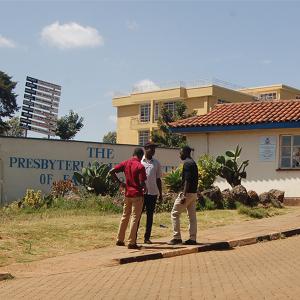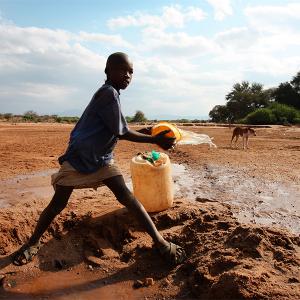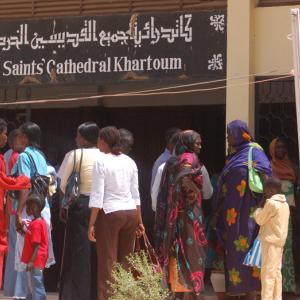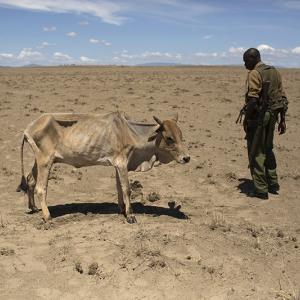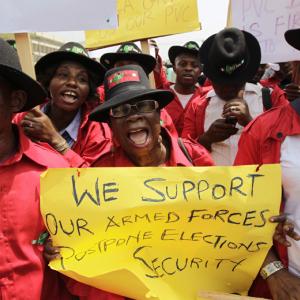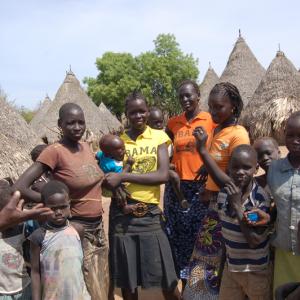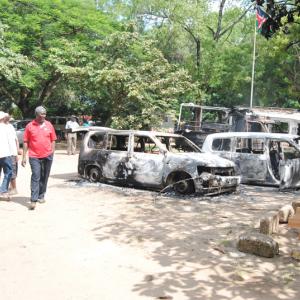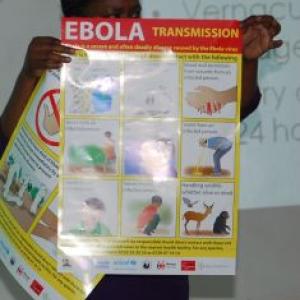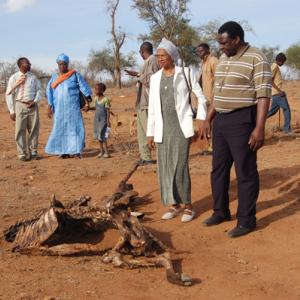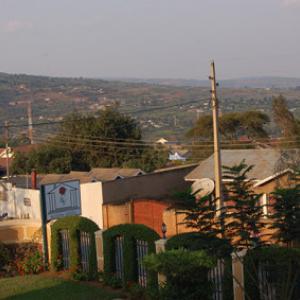Fredrick Nzwili is a journalist based in Nairobi, Kenya. For more than 15 years, he has written about religion, politics, peace and conflict, development, security, environment and wildlife. His articles have appeared in international media organizations among others; The Tablet, The Christian Science Monitor, The National Geographic and Kenyan local newspapers; The Standard and the People Daily.
Posts By This Author
Church in Congo Suspends Sacraments as Ebola Spreads
The DRC government and World Health Organization, working with church-based aid organizations and others, have mounted a massive effort to contain the virus. For the first time WHO has used a vaccine to prevent the disease.
In Kenya, Debt-Ridden Christian Universities Struggle to Stay Open
Even many within the Christian universities said they grew too fast, did not allocate money well — or both.
Kenyan Churches On the Front Lines of Climate Change Fight to Serve the Starving
At the Thatha Roman Catholic Mission, part of the Machakos Diocese, the Rev. Gerard Matolo increasingly sees more people seeking help.
“You can’t tell them that there is nothing,” Matolo said. “As their shepherd, I have to find a way to ensure they get something to eat. Sometimes I share my own food.”
Sudan Detains Ten Women for Wearing Miniskirts and Trousers to Church
Sudanese authorities have detained 10 Christian students on a charge of indecent dressing, a criminal offense, after they wore miniskirts and trousers to church.
The young women were arrested last month in front of the Evangelical Baptist Church in the war-torn Nuba Mountains region in South Kordofan.
The girls, ages 17 to 23, had attended a ceremony at the church.
Police charged 12 women under Sudan’s 1991 Criminal Act, but two were released. The rest are to appear in court in coming days. If convicted, each will face 40 lashes.
Kenya’s Catholic Church to Fight Hunger by Farming Its Vast Land Reserves
Drying livestock carcasses and anguished faces of hungry women and children have become a common feature here as droughts increase due to climate change.
But now, in an effort to fight hunger, the Roman Catholic Church is making 3,000 acres of church-owned land available for commercial farming.
“We want to produce food, create employment, and improve quality of life for the people,” said the Rev. Celestino Bundi, Kenya’s national director of the Pontifical Mission Societies.
This is the first time the church has entered into large-scale farming, though it owns massive tracts of land across the country, most of which is idle and in the hands of dioceses, parishes, missionaries, and congregations.
“We have the will and the support of the community and government,” said Bundi.
“I think time has come for Kenya to feed herself.”
Nigeria Postpones Presidential Election, Citing Ongoing Violence by Boko Haram
Nigeria’s election commission has postponed national elections for six weeks saying it would not be able to provide security for voters in the northeast region of the country most affected by the Islamist group Boko Haram.
Attahiru Jega, head of the Independent National Electoral Commission, announced Feb. 7 that the elections scheduled for Feb. 14 had been moved to March 28. Nigeria is slated to elect a president for a four-year term. Goodluck Jonathan, the current president and a Christian, is running for re-election alongside 13 other candidates, including his most formidable challenger, Muhammadu Buhari, a Muslim.
Jonathan has been sharply criticized for his management of the Boko Haram crisis and some Western leaders suggested the postponement was a last-ditch effort to shore up his vote.
But church leaders in the war-hit regions welcomed the move.
“Many Christians here had not collected their voter cards and this may afford them time to do so,” said the Rev. John Bakeni, the secretary of the Roman Catholic Diocese of Maiduguri.
Focus on Africa’s Islamic Extremists has Diverted Attention from South Sudan’s Growing Crisis
As world attention shifts to the growing influence of Muslim militant groups on the African continent, few have paid any attention to the ongoing bloody conflict in South Sudan.
An estimated 50,000 people have died and 2 million have been displaced in the latest phase of fighting in this nation, according to the International Crisis Group, a think tank that aims to prevent and resolve such conflicts. That’s about five times more than in northern Nigeria, where the Islamist militant group Boko Haram has killed more than 5,000 people in six years.
“South Sudan’s conflict is not getting much attention due to shifting interests towards Islamic extremism,” said the Rev. Fred Nyabera of Kenya, a social scientist who is director of the Interfaith Initiative to End Child Poverty at the global faith-based organization Arigatou International. “This has become a global issue because of the immediate threats it poses to nations.
“But leaving South Sudan alone at this time when the people are trying to define their identity and country, under very fragile circumstances, is to postpone a big problem,” Nyabera added.
Islamic Insurgency Isn’t Just a Mideast Problem — Look to Africa, Too
The rise of the so-called Islamic State dominated headlines in 2014, and trained the eyes of the world back on the Middle East.
Perhaps it should have looked at Africa as well.
In 2014, Africans suffered dozens of deadly terror attacks by groups either allied with Islamic State leader Abu Bakr Al-Baghdadi or using similarly bloody tactics.
Consider:
- In Nigeria: Boko Haram Islamists swept through the states of Yobe, Borno and Adamawa, killing and kidnapping civilians both Christian and Muslim. The group abducted more than 200 girls from a school in Chibok in April. The girls are still in captivity and the abduction still continues to draw global outrage.
- In Kenya: the Islamist militant group, Al-Shabab massacred 64 non-Muslims in Mandera County in November and December. The victims were separated from Muslims and shot on the head. In June, Al-Shabab killed 48 people — mainly Christians — in the Mpeketoni area in Lamu County.
- In Egypt: Ansar Bayt Al-Maqdis, the Sinai-based terror group, which recently pledged allegiance to the Islamic State, took responsibility for a deadly terror attack, which left 31 Egyptian soldiers dead.
- In the Central African Republic: Former members of the Islamist coalition Seleka were accused of massacring 34 people in villages in northern CAR. In May, Seleka was accused of killing 11 people, in an attack at the Fatima Catholic Church in Bangui.
Sierra Leone Bans Christmas, New Year’s Celebrations to Prevent Spread of Ebola
The government of Sierra Leone banned public Christmas and New Year’s celebrations because they may exacerbate efforts to eradicate the Ebola virus.
President Ernest Bai Koroma said that despite immense help from the international community, the number of people infected with the virus continues to rise.
Ebola infections in Sierra Leone recently surpassed those of Liberia and Guinea.
“The illness started at the border and now is in the cities and close to 2,000 people have died from the outbreak,” Koroma told reporters. He asked traditional leaders and tribal chiefs to quit performing rituals in hopes that will help curb Ebola.
The majority of Sierra Leone’s 6 million people are Muslim, but Christmas is widely celebrated among the 27 percent of people who are Christian.
Officials said soldiers will be deployed on the streets and people are advised to stay at home with their families.
In Africa, Church Leaders Responding to Climate Change Locally and Globally
As climate change devastates communities in Kenya, church leaders are helping to address the crisis locally while also calling on industrialized nations to own up to their responsibilities for spewing greenhouse gas emissions into the atmosphere.
“But we (in Africa) also have a role to play because we have not been very good stewards of the environment,” added Gichira, a poverty and development expert.“I think they (industrialized nations) are responsible for most of the emissions,” said Peter Solomon Gichira, the climate change program officer at the All Africa Conference of Churches. “They have responsibility to support climate change adaptation and mitigation as a moral obligation.”
People living in the Global South such as Kenya are suffering the worst consequences, climate experts say.
Droughts have become more severe and recurrent and are frequently followed by excessive rains or floods. Temperatures are much higher and weather patterns are now unpredictable.
Murdered Nuns Laid to Rest in the Congo as Crime Investigation Continues
Three elderly Italian nuns murdered in Burundi were laid to rest Sept. 11 in a Xaverian cemetery in the Democratic Republic of Congo amid heightened calls for action about their death.
Sister Lucia Pulici, 75, Sister Olga Raschietti, 82, and Sister Bernadetta Boggian, 79, of the Xaverian Missionary Sisters of Mary were gruesomely murdered Sunday in their convent in the Kamenge area of Burundi’s capital, Bujumbura.
The triple murders shocked Christians across the globe and ignited calls for the protection of sisters worldwide. The nuns were reportedly beaten and killed with a knife. At least one nun was decapitated. There were conflicting reports about whether they had been raped.

